Arguments for God's Existence: A Philosophical Analysis Essay
VerifiedAdded on 2023/06/05
|6
|1351
|348
Essay
AI Summary
This essay delves into the philosophical arguments surrounding the existence of God, examining three primary arguments: the ontological, cosmological, and teleological arguments. The essay begins by exploring the ontological argument, focusing on its various versions and discussing how the very definition of God implies His existence. The cosmological argument is then analyzed, presenting both vertical and horizontal perspectives, and discussing God as the initial cause of all events. Finally, the teleological argument is examined, highlighting intelligent design and its implications for the existence of a divine creator. The essay concludes by suggesting that the ontological argument is the most plausible due to its realistic approach and empirical evidence. The essay provides a comprehensive overview of these philosophical concepts, offering insights into the ongoing debate about God's existence.
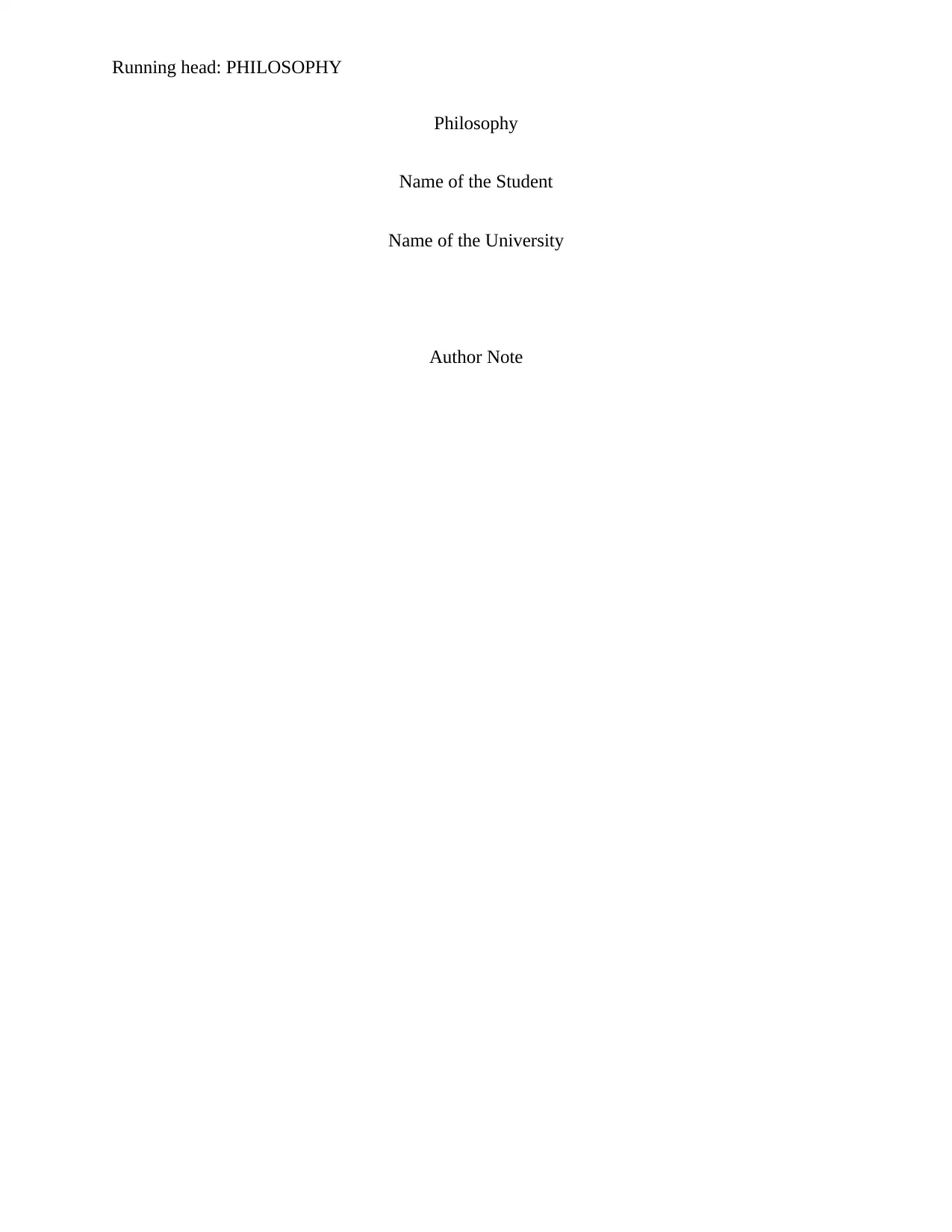
Running head: PHILOSOPHY
Philosophy
Name of the Student
Name of the University
Author Note
Philosophy
Name of the Student
Name of the University
Author Note
Paraphrase This Document
Need a fresh take? Get an instant paraphrase of this document with our AI Paraphraser
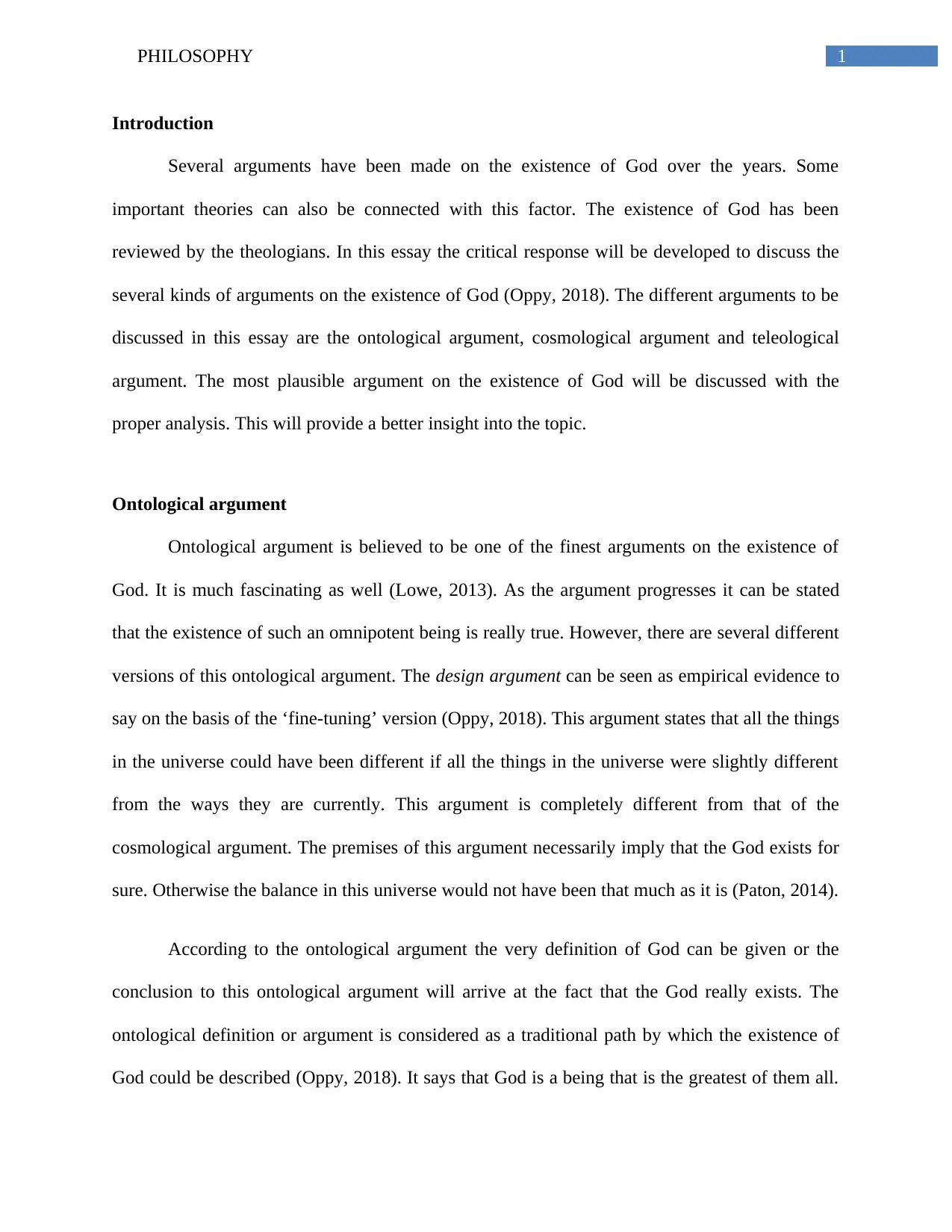
1PHILOSOPHY
Introduction
Several arguments have been made on the existence of God over the years. Some
important theories can also be connected with this factor. The existence of God has been
reviewed by the theologians. In this essay the critical response will be developed to discuss the
several kinds of arguments on the existence of God (Oppy, 2018). The different arguments to be
discussed in this essay are the ontological argument, cosmological argument and teleological
argument. The most plausible argument on the existence of God will be discussed with the
proper analysis. This will provide a better insight into the topic.
Ontological argument
Ontological argument is believed to be one of the finest arguments on the existence of
God. It is much fascinating as well (Lowe, 2013). As the argument progresses it can be stated
that the existence of such an omnipotent being is really true. However, there are several different
versions of this ontological argument. The design argument can be seen as empirical evidence to
say on the basis of the ‘fine-tuning’ version (Oppy, 2018). This argument states that all the things
in the universe could have been different if all the things in the universe were slightly different
from the ways they are currently. This argument is completely different from that of the
cosmological argument. The premises of this argument necessarily imply that the God exists for
sure. Otherwise the balance in this universe would not have been that much as it is (Paton, 2014).
According to the ontological argument the very definition of God can be given or the
conclusion to this ontological argument will arrive at the fact that the God really exists. The
ontological definition or argument is considered as a traditional path by which the existence of
God could be described (Oppy, 2018). It says that God is a being that is the greatest of them all.
Introduction
Several arguments have been made on the existence of God over the years. Some
important theories can also be connected with this factor. The existence of God has been
reviewed by the theologians. In this essay the critical response will be developed to discuss the
several kinds of arguments on the existence of God (Oppy, 2018). The different arguments to be
discussed in this essay are the ontological argument, cosmological argument and teleological
argument. The most plausible argument on the existence of God will be discussed with the
proper analysis. This will provide a better insight into the topic.
Ontological argument
Ontological argument is believed to be one of the finest arguments on the existence of
God. It is much fascinating as well (Lowe, 2013). As the argument progresses it can be stated
that the existence of such an omnipotent being is really true. However, there are several different
versions of this ontological argument. The design argument can be seen as empirical evidence to
say on the basis of the ‘fine-tuning’ version (Oppy, 2018). This argument states that all the things
in the universe could have been different if all the things in the universe were slightly different
from the ways they are currently. This argument is completely different from that of the
cosmological argument. The premises of this argument necessarily imply that the God exists for
sure. Otherwise the balance in this universe would not have been that much as it is (Paton, 2014).
According to the ontological argument the very definition of God can be given or the
conclusion to this ontological argument will arrive at the fact that the God really exists. The
ontological definition or argument is considered as a traditional path by which the existence of
God could be described (Oppy, 2018). It says that God is a being that is the greatest of them all.
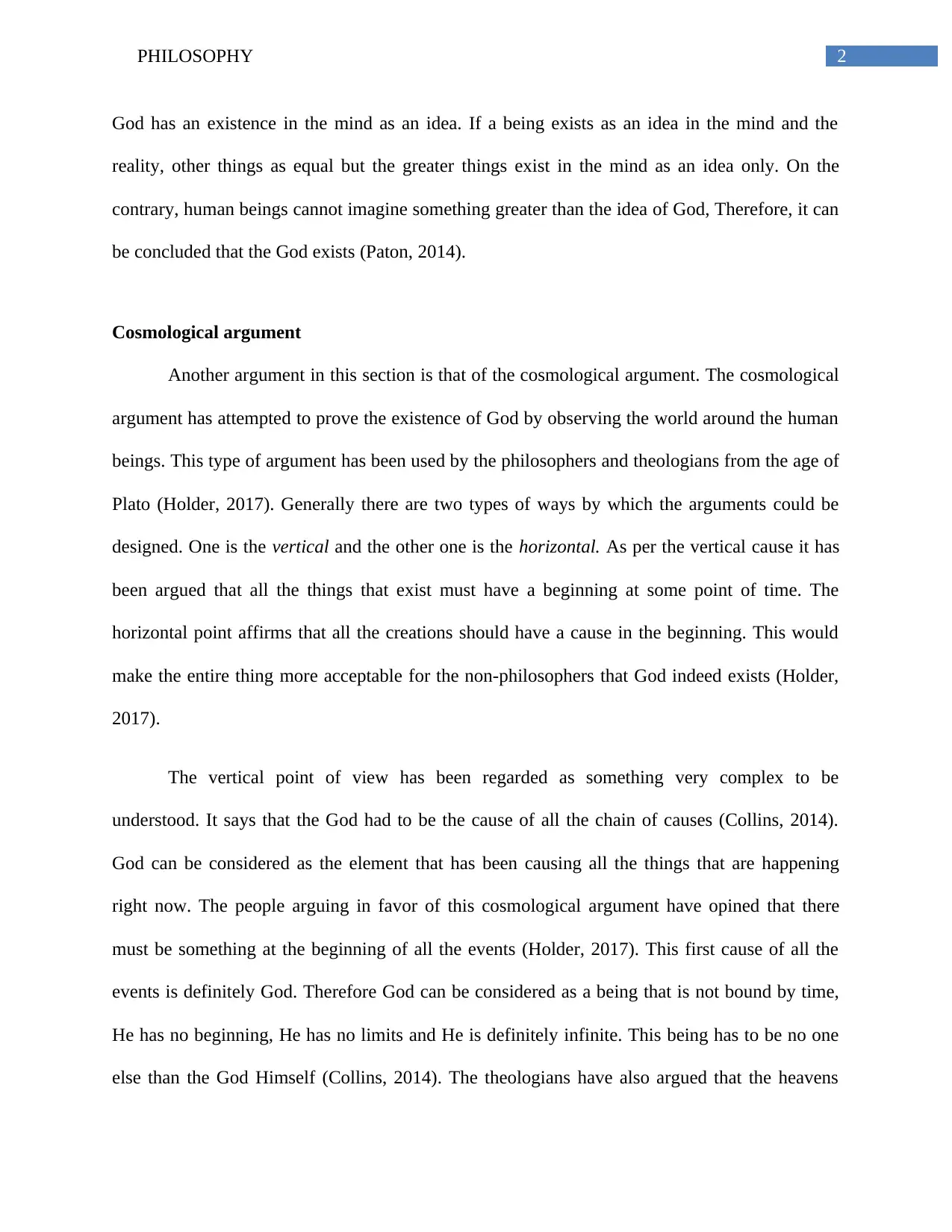
2PHILOSOPHY
God has an existence in the mind as an idea. If a being exists as an idea in the mind and the
reality, other things as equal but the greater things exist in the mind as an idea only. On the
contrary, human beings cannot imagine something greater than the idea of God, Therefore, it can
be concluded that the God exists (Paton, 2014).
Cosmological argument
Another argument in this section is that of the cosmological argument. The cosmological
argument has attempted to prove the existence of God by observing the world around the human
beings. This type of argument has been used by the philosophers and theologians from the age of
Plato (Holder, 2017). Generally there are two types of ways by which the arguments could be
designed. One is the vertical and the other one is the horizontal. As per the vertical cause it has
been argued that all the things that exist must have a beginning at some point of time. The
horizontal point affirms that all the creations should have a cause in the beginning. This would
make the entire thing more acceptable for the non-philosophers that God indeed exists (Holder,
2017).
The vertical point of view has been regarded as something very complex to be
understood. It says that the God had to be the cause of all the chain of causes (Collins, 2014).
God can be considered as the element that has been causing all the things that are happening
right now. The people arguing in favor of this cosmological argument have opined that there
must be something at the beginning of all the events (Holder, 2017). This first cause of all the
events is definitely God. Therefore God can be considered as a being that is not bound by time,
He has no beginning, He has no limits and He is definitely infinite. This being has to be no one
else than the God Himself (Collins, 2014). The theologians have also argued that the heavens
God has an existence in the mind as an idea. If a being exists as an idea in the mind and the
reality, other things as equal but the greater things exist in the mind as an idea only. On the
contrary, human beings cannot imagine something greater than the idea of God, Therefore, it can
be concluded that the God exists (Paton, 2014).
Cosmological argument
Another argument in this section is that of the cosmological argument. The cosmological
argument has attempted to prove the existence of God by observing the world around the human
beings. This type of argument has been used by the philosophers and theologians from the age of
Plato (Holder, 2017). Generally there are two types of ways by which the arguments could be
designed. One is the vertical and the other one is the horizontal. As per the vertical cause it has
been argued that all the things that exist must have a beginning at some point of time. The
horizontal point affirms that all the creations should have a cause in the beginning. This would
make the entire thing more acceptable for the non-philosophers that God indeed exists (Holder,
2017).
The vertical point of view has been regarded as something very complex to be
understood. It says that the God had to be the cause of all the chain of causes (Collins, 2014).
God can be considered as the element that has been causing all the things that are happening
right now. The people arguing in favor of this cosmological argument have opined that there
must be something at the beginning of all the events (Holder, 2017). This first cause of all the
events is definitely God. Therefore God can be considered as a being that is not bound by time,
He has no beginning, He has no limits and He is definitely infinite. This being has to be no one
else than the God Himself (Collins, 2014). The theologians have also argued that the heavens
⊘ This is a preview!⊘
Do you want full access?
Subscribe today to unlock all pages.

Trusted by 1+ million students worldwide
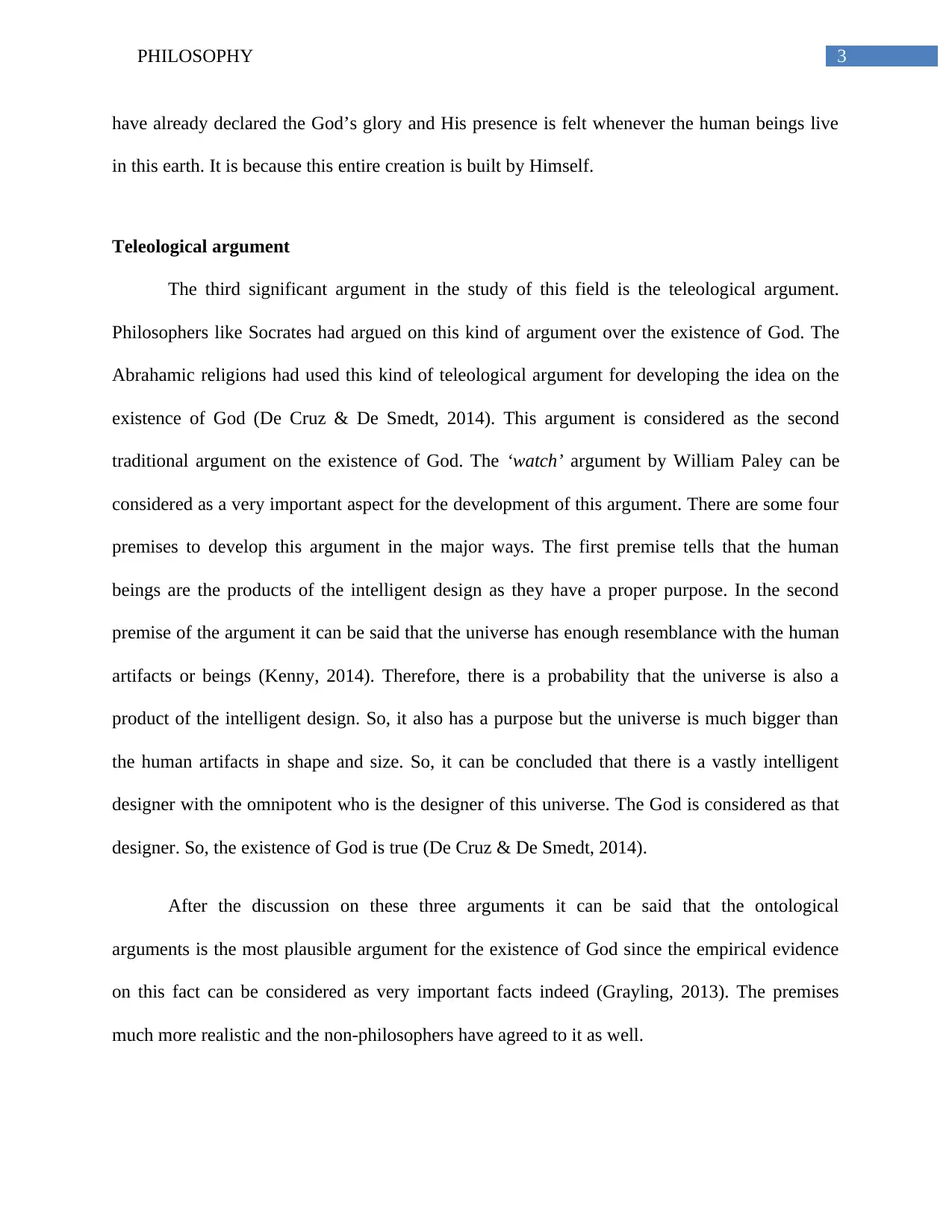
3PHILOSOPHY
have already declared the God’s glory and His presence is felt whenever the human beings live
in this earth. It is because this entire creation is built by Himself.
Teleological argument
The third significant argument in the study of this field is the teleological argument.
Philosophers like Socrates had argued on this kind of argument over the existence of God. The
Abrahamic religions had used this kind of teleological argument for developing the idea on the
existence of God (De Cruz & De Smedt, 2014). This argument is considered as the second
traditional argument on the existence of God. The ‘watch’ argument by William Paley can be
considered as a very important aspect for the development of this argument. There are some four
premises to develop this argument in the major ways. The first premise tells that the human
beings are the products of the intelligent design as they have a proper purpose. In the second
premise of the argument it can be said that the universe has enough resemblance with the human
artifacts or beings (Kenny, 2014). Therefore, there is a probability that the universe is also a
product of the intelligent design. So, it also has a purpose but the universe is much bigger than
the human artifacts in shape and size. So, it can be concluded that there is a vastly intelligent
designer with the omnipotent who is the designer of this universe. The God is considered as that
designer. So, the existence of God is true (De Cruz & De Smedt, 2014).
After the discussion on these three arguments it can be said that the ontological
arguments is the most plausible argument for the existence of God since the empirical evidence
on this fact can be considered as very important facts indeed (Grayling, 2013). The premises
much more realistic and the non-philosophers have agreed to it as well.
have already declared the God’s glory and His presence is felt whenever the human beings live
in this earth. It is because this entire creation is built by Himself.
Teleological argument
The third significant argument in the study of this field is the teleological argument.
Philosophers like Socrates had argued on this kind of argument over the existence of God. The
Abrahamic religions had used this kind of teleological argument for developing the idea on the
existence of God (De Cruz & De Smedt, 2014). This argument is considered as the second
traditional argument on the existence of God. The ‘watch’ argument by William Paley can be
considered as a very important aspect for the development of this argument. There are some four
premises to develop this argument in the major ways. The first premise tells that the human
beings are the products of the intelligent design as they have a proper purpose. In the second
premise of the argument it can be said that the universe has enough resemblance with the human
artifacts or beings (Kenny, 2014). Therefore, there is a probability that the universe is also a
product of the intelligent design. So, it also has a purpose but the universe is much bigger than
the human artifacts in shape and size. So, it can be concluded that there is a vastly intelligent
designer with the omnipotent who is the designer of this universe. The God is considered as that
designer. So, the existence of God is true (De Cruz & De Smedt, 2014).
After the discussion on these three arguments it can be said that the ontological
arguments is the most plausible argument for the existence of God since the empirical evidence
on this fact can be considered as very important facts indeed (Grayling, 2013). The premises
much more realistic and the non-philosophers have agreed to it as well.
Paraphrase This Document
Need a fresh take? Get an instant paraphrase of this document with our AI Paraphraser
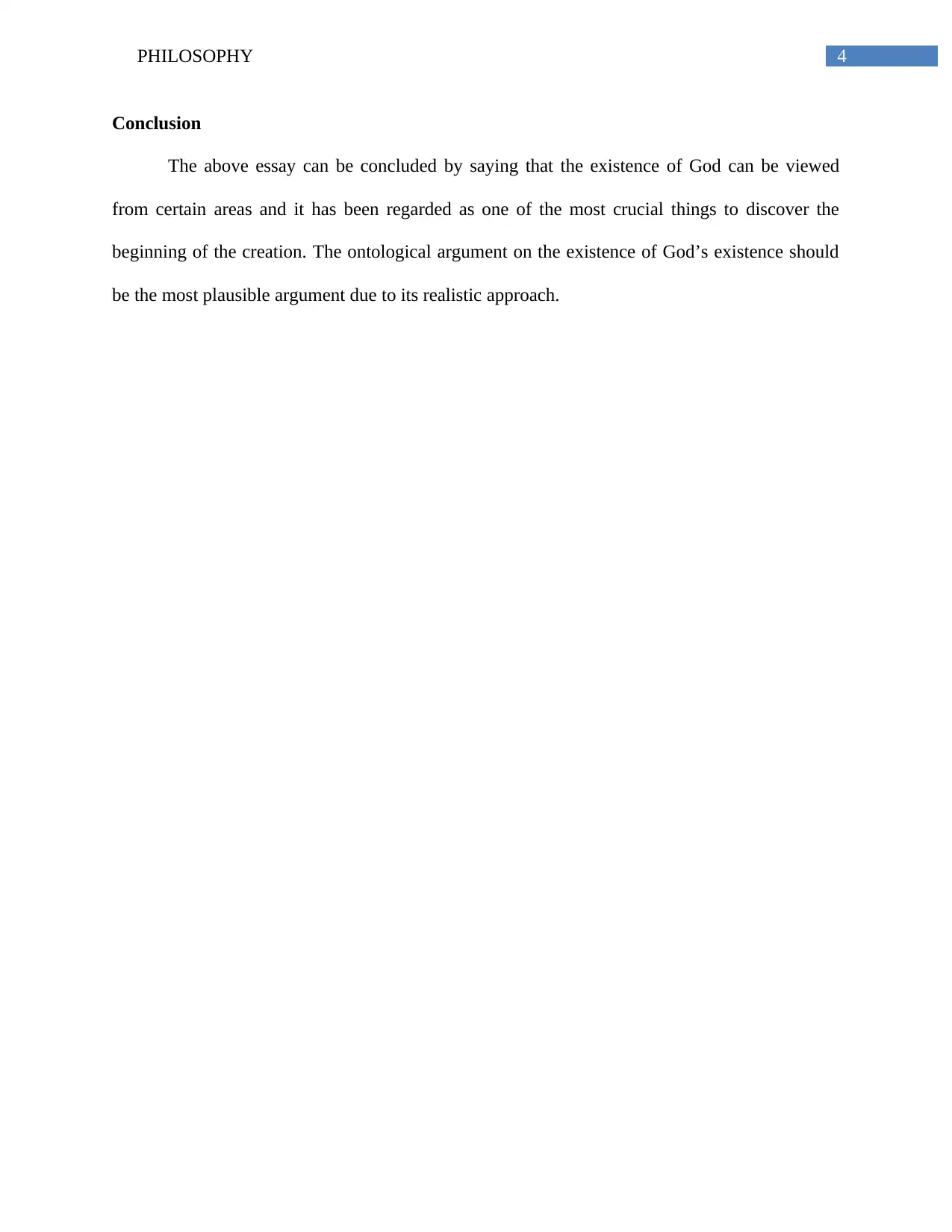
4PHILOSOPHY
Conclusion
The above essay can be concluded by saying that the existence of God can be viewed
from certain areas and it has been regarded as one of the most crucial things to discover the
beginning of the creation. The ontological argument on the existence of God’s existence should
be the most plausible argument due to its realistic approach.
Conclusion
The above essay can be concluded by saying that the existence of God can be viewed
from certain areas and it has been regarded as one of the most crucial things to discover the
beginning of the creation. The ontological argument on the existence of God’s existence should
be the most plausible argument due to its realistic approach.
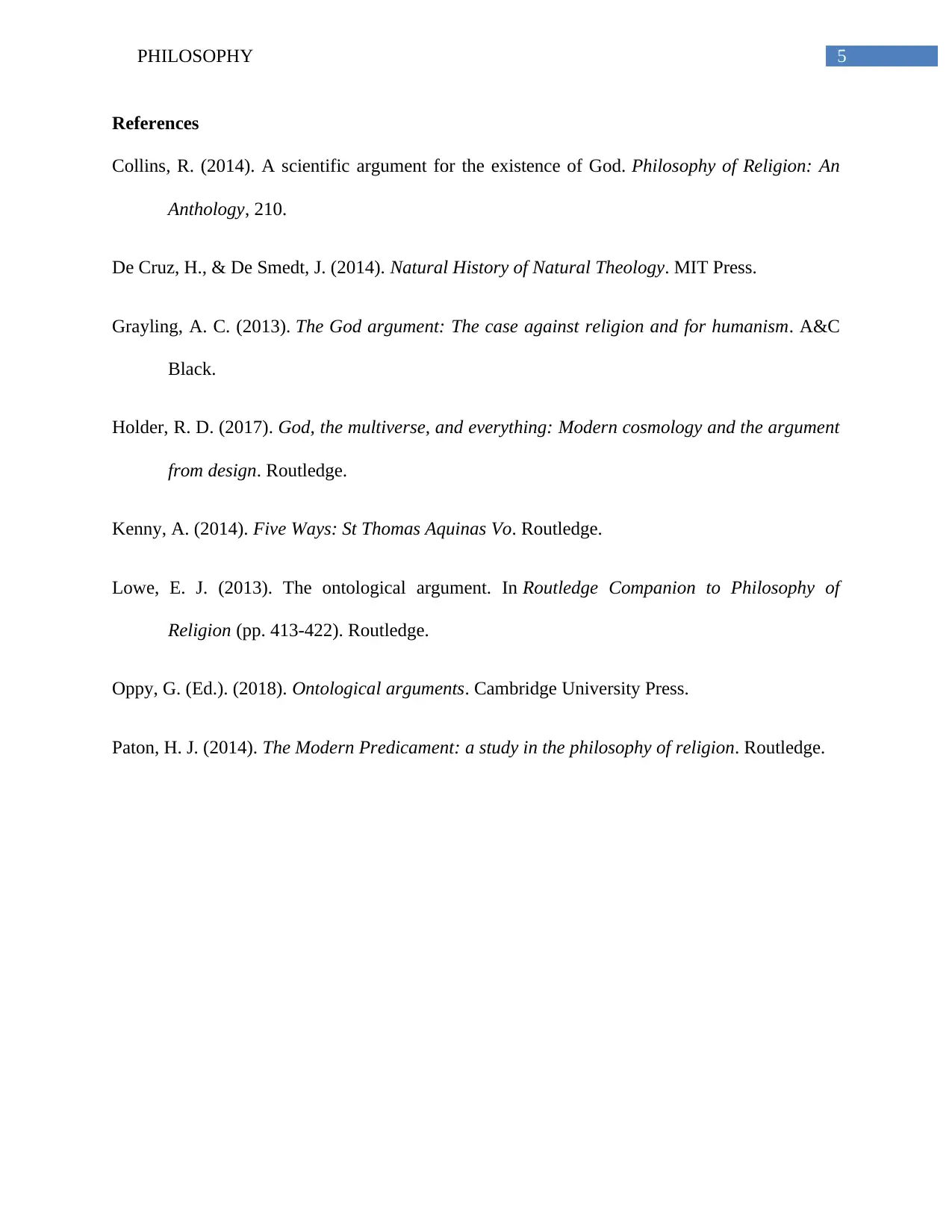
5PHILOSOPHY
References
Collins, R. (2014). A scientific argument for the existence of God. Philosophy of Religion: An
Anthology, 210.
De Cruz, H., & De Smedt, J. (2014). Natural History of Natural Theology. MIT Press.
Grayling, A. C. (2013). The God argument: The case against religion and for humanism. A&C
Black.
Holder, R. D. (2017). God, the multiverse, and everything: Modern cosmology and the argument
from design. Routledge.
Kenny, A. (2014). Five Ways: St Thomas Aquinas Vo. Routledge.
Lowe, E. J. (2013). The ontological argument. In Routledge Companion to Philosophy of
Religion (pp. 413-422). Routledge.
Oppy, G. (Ed.). (2018). Ontological arguments. Cambridge University Press.
Paton, H. J. (2014). The Modern Predicament: a study in the philosophy of religion. Routledge.
References
Collins, R. (2014). A scientific argument for the existence of God. Philosophy of Religion: An
Anthology, 210.
De Cruz, H., & De Smedt, J. (2014). Natural History of Natural Theology. MIT Press.
Grayling, A. C. (2013). The God argument: The case against religion and for humanism. A&C
Black.
Holder, R. D. (2017). God, the multiverse, and everything: Modern cosmology and the argument
from design. Routledge.
Kenny, A. (2014). Five Ways: St Thomas Aquinas Vo. Routledge.
Lowe, E. J. (2013). The ontological argument. In Routledge Companion to Philosophy of
Religion (pp. 413-422). Routledge.
Oppy, G. (Ed.). (2018). Ontological arguments. Cambridge University Press.
Paton, H. J. (2014). The Modern Predicament: a study in the philosophy of religion. Routledge.
⊘ This is a preview!⊘
Do you want full access?
Subscribe today to unlock all pages.

Trusted by 1+ million students worldwide
1 out of 6
Related Documents
Your All-in-One AI-Powered Toolkit for Academic Success.
+13062052269
info@desklib.com
Available 24*7 on WhatsApp / Email
![[object Object]](/_next/static/media/star-bottom.7253800d.svg)
Unlock your academic potential
Copyright © 2020–2025 A2Z Services. All Rights Reserved. Developed and managed by ZUCOL.





